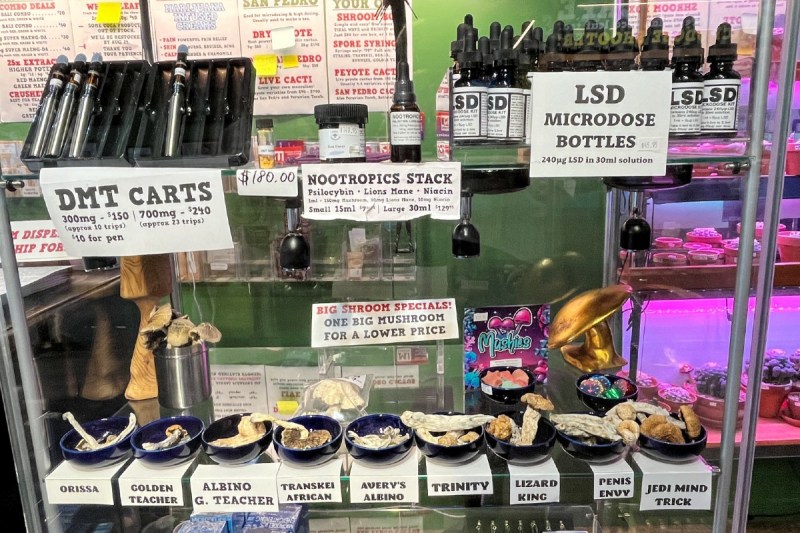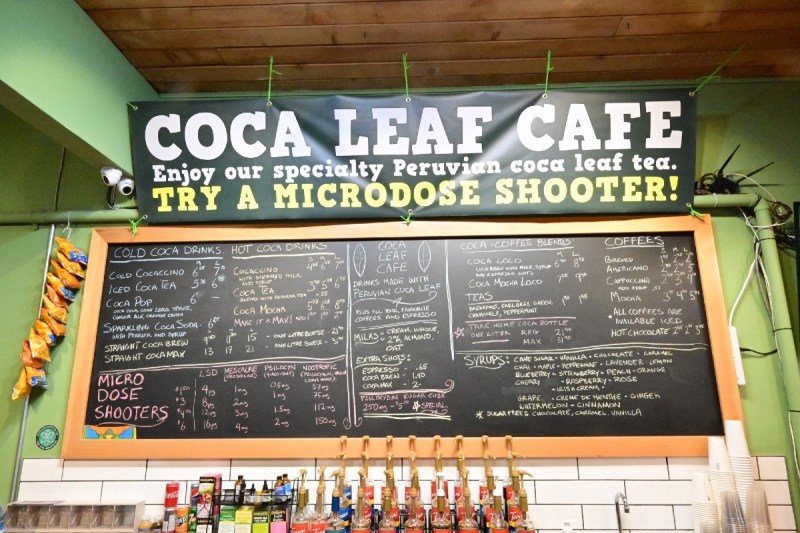A Chinese woman of about sixty years old entered the shop, approached the counter fast without hesitating to check out the trippy posters that decorated the walls nor the far-out substances on display behind glass next to the register, and launched right into it.
“I don’t know anything about mushrooms. My friend gave me a mushroom pill and said that it would make me happy again, and it worked,” she said. Now her posture shrank a little and her voice became quiet. “I just want to be happy again.”
“Of course you do!” The woman seated behind the counter smiled and then delivered a cursory explanation of how research showed that psilocybin—the psychotropic compound in so-called magic mushrooms—could be a highly effective treatment for depression and other mood disorders. Then she launched into an overview of the different mushrooms they had for sale, ultimately recommending that the woman start out by trying microdosing. She set a little box on the counter, and the customer (or patient, perhaps) eyed it warily.
“This isn’t going to turn me into a crying mess, will it?”
“Not these.” The cashier shook her head, then gestured to a different product. “These will.”

A store like no other
Located in Vancouver, BC’s troubled downtown junkie district of East Hastings, the Medicinal Mushroom Dispensary is a truly one-of-a-kind establishment. In this humble shop, one can buy various forms of mushrooms, LSD, DMT, peyote, and a range of other substances. There’s also an onsite cafe where you can buy drinks made with coca leaf—the plant that can be processed into cocaine—as well as the cheapest sandwiches in town.
While shifting attitudes toward psychedelics have resulted in the gradual introduction of a range of psychedelic businesses—or at least psychedelic-adjacent businesses—across Canada and the U.S. (Mexico has long turned a blind eye to cafes selling psychedelic mushrooms in a handful of remote villages in the mountains of Oaxaca, though these have always struck me less as proper businesses than straight up witches’ huts), this is the only “dispensary” on the continent to go all-in in terms of selling the strangest of the strange. Psychedelics are illegal in Canada, so how does the Medicinal Mushroom Dispensary operate legally?
Simply put, it doesn’t. When asked, a member of the staff told me something about operating in a “legal grey area,” but it turns out that there’s nothing legal or grey about it. It’s outright illegal. But—perhaps by the grace of the DMT elves—the Fuzz has elected to look the other way.
When pressed on why the police nor the city have moved to shut the business down—let alone make any arrests—representatives of both have expressed that they’re more concerned with addressing the opioid crisis rather than wrestling with the increasingly embraced psychedelic scene. It probably isn’t a stretch to guess that they see the writing on the wall. Psilocybin mushrooms and ketamine are already allowed in Canada for patients with certain health conditions, and it likely won’t be long before natural substances like mushrooms and peyote gain fully decriminalized if not legal status. Synthetic substances like MDMA and LSD might be slower to the decrim/legalization party, but they’re on the horizon.

Taking safety seriously
Just because the shop flaunts the law doesn’t mean that they don’t have a mind for safety considerations. Beside the register are several stacks of educational material explaining the benefits and risks associated with each substance. And new initiates to the “club”—for customers must become card-carrying “members” before they can buy any of the stronger substances (a policy that is almost certainly intended to ward off certain legal challenges)—receive detailed guidance on how to safely use the drugs.
Having spent a good amount of time hanging around the store sipping cocaccinos and taking in the vibe, I can report that its owner and staff are benevolently dedicated to the psychedelic cause. This is no cynical venture attempting to capitalize on a fast-rising trend—these people are out to help those in need.
And there is no greater reminder of the importance of that help than the neighborhood in which the dispensary operates. The ravages of the opioid crisis are all-too-obvious on the sidewalks of East Hastings, and studies have repeatedly shown that psychedelics can be a powerful tool for treating addiction—far more effective, statistically, than any other treatment we have at our disposal. Beyond addiction, depression and anxiety have reached epidemic proportions, and here again, science has shown that psychedelics can be a highly effective solution.
So while the existence of the Medicinal Mushroom Dispensary is awesome (or perhaps radical—in the 1990s sense of the word—is a more accurate descriptor), it’s also important to the community it serves.



